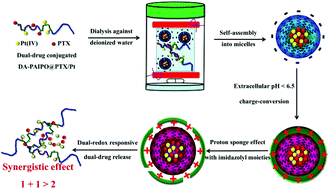Dual-drug delivery based charge-conversional polymeric micelles for enhanced cellular uptake and combination therapy†
Abstract
Combination therapy and efficient delivery of two or more drugs into cancer cells to obtain a superior cell-killing performance is one of the major challenges of cancer therapy due to the pathological complexity, multi-drug resistance and inefficient cellular uptake. Herein, we employed reversible addition–fragmentation chain transfer (RAFT) polymerization to prepare poly(AMA-co-IMMA)-b-poly(OEGMA) (PAIPO) copolymers, and paclitaxel (PTX) and cis-platinum (Pt(II)) were then co-conjugated, thus developing a novel approach for prodrug-based combination chemotherapy. In addition, pH-sensitive charge-conversion, dual-redox dual-drug release behavior, cytotoxicity of micelles against two cancer cell lines (HeLa and Skov-3) and the synergistic effects of the dual-drug were evaluated. Accordingly, both free-(PTXn/Pt) and micelle-(PTXn/Pt) showed a synergism (combination index (CI) was always lower than 1), and (PTX0.2/Pt) and (PTX2/Pt) in the micellar form exhibited the strongest synergism against HeLa (CI = 0.37) and Skov-3 (CI = 0.41) cells, respectively. What's more, the cellular uptake and flow cytometric profiles displayed that an enhanced cellular uptake and endo/lysosome escape occurred owing to the charge-conversion of micelles and the proton sponge effect of imidazolyl moieties, respectively, thereby exhibiting a higher cell-killing performance. To the best of our knowledge, this is the first report on prodrug-based systems with charge-conversion for a co-delivery (PTXn/Pt) complex for combination cancer therapy.



 Please wait while we load your content...
Please wait while we load your content...